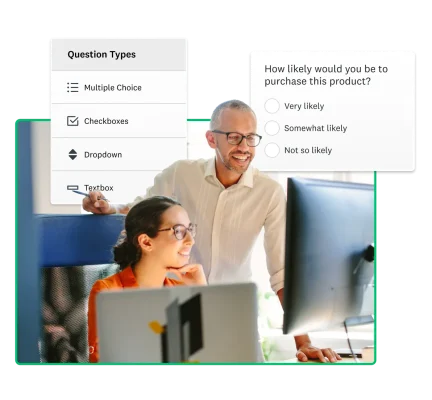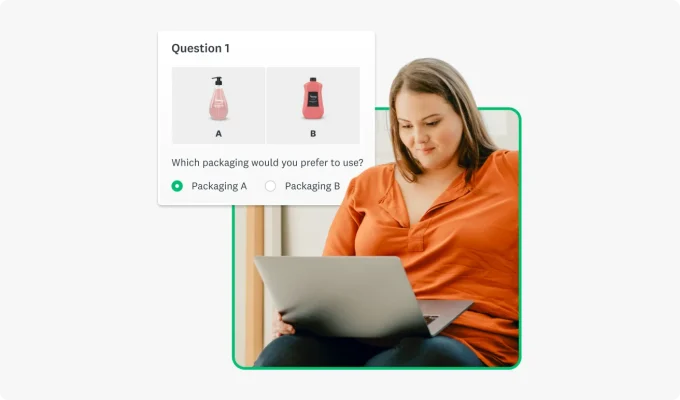How to use multiple-choice questions in research
Perfect multiple choice questionnaires for research. Write clear multiple choice questions that provide actionable feedback and survey data.

Multiple-choice questions are a leading question style that researchers use to gather data.
What makes a good multiple-choice question, and how can companies use them to generate actionable insights from their respondents?
In this article, we’ll discuss the different types of survey questions, touch on the power of multiple-choice questions, outline various ways to utilize them, and provide examples of effective use cases for these question styles.
What are multiple-choice questions?
Multiple-choice questions are survey response formats that provide respondents with answer choices. Answer options are worded or use a numbered rating scale format.
Multiple-choice questions are closed-ended questions that are effective for gathering quantitative data. You can also pair a multiple-choice question with an open-ended question to gather detailed information supporting respondents' multiple-choice answers.
Why use multiple-choice questions?
Multiple-choice questions are a fundamental aspect of creating surveys for good reason.
As a market research tool, for example, they allow people to indicate their demographic, choose certain opinions, and select behavioral responses that closely align with them.
They provide numerous advantages to survey creators, researchers, and respondents:
- Effective at gathering quantitative data: Multiple-choice questionnaires in research are very easy to respond to, as respondents only need to click the answer option they most agree with.
- Useful for screening: Multiple-choice questions are useful for screening respondents at the start of a survey. You can ask questions to determine a candidate's suitability and allow them to continue if they meet certain criteria.
- Easy to analyze: Researchers can rapidly scan numerical data gathered through multiple-choice questions and create in-depth analyses.
However, while multiple-choice questions are extremely useful, they also have drawbacks. For example, they can’t offer qualitative insights, meaning you’ll have to pair them with other question formats to get the whole story.
Similarly, your listed response options might not align with a person’s true opinion, reducing the accuracy of your survey or increasing rates of non-completion.

8 types of multiple-choice questions
There are several different formats that multiple-choice questions can take. Here are some of the most common styles of multiple-choice questions researchers use.
1. Rating scales
Rating scales are a selection of predefined answers that respondents choose from to reflect their opinion on the question. For example, you could have a simple numerical scale of 1-10 or a written scale of "xzstrongly disagree" to "strongly agree."
2. Word scale questions
Word scale multiple-choice questions are a type of Likert scale question. These questions prompt respondents to choose from 5-7 possible answers that measure opinions, motivations, and attitudes.
This form of question typically asks something like, “Do you like our product?” Users then select from “Don’t like the product at all” to “Like the product a lot.” Researchers can assign each answer a numerical value for later analysis.
Word scale questions like these are useful as they provide granular feedback about the degree of someone’s opinions. Instead of a binary answer, you’ll receive a range of feedback across the opinion spectrum.
3. Number scale questions
Number scale questions allow respondents to rate on a scale (generally of 0-10) to showcase their opinions.
An example of a number-scale question in action is a customer satisfaction survey, like Net Promoter Score® (NPS), which asks customers, “How likely is it that you would recommend this company to a friend or colleague?”
Respondents select a single answer on a scale of 0-10, with 0 reflecting "Not likely at all" and 10 being "Extremely likely." Their opinions are easy to understand, rapid to respond to, easy to analyze, and has a high degree of response flexibility.
4. Slider questions
Slider questions are similar to number scale questions but offer a different user interface experience. Instead of selecting on a scale of 1-10, respondents will slide an interactive scale to determine where they fall on a spectrum.
You could use a slider question instead of a number-scale one to give respondents a visual reference point. However, sliding scale questions could be more difficult to use on some mobile devices.
5. Star rating questions
Star rating questions are another style of rating scale that people are extremely familiar with. They most commonly ask users to rate their experience with a certain company or event on a scale of one to five. One star is the worst possible review, while five stars reflect a fantastic experience.
Star rating questions are a popular way of offering opinions. Most review sites use a star rating, from rating a restaurant to giving a personal opinion about a movie. This form of rating scale is easy to understand, with its visual nature making it a universal response system.
However, star rating systems often lack the flexibility that other, more broad rating scales offer, especially when there are only five response options.
6. Matrix questions
Matrix-style multiple-choice questions offer a grid of questions and responses that users can fill out. They are a convenient format that allows respondents to give feedback rapidly, making them a great choice if you need to gather many different question responses.
For example, you could ask, “How satisfied are you with each of the following?” and then question your customers about several aspects of the product.
You could have one row for the style of the product, its ease of use, the price, and so on. Each column would then have a particular response, from very satisfied to very dissatisfied, with users selecting where they fall on the spectrum for each row’s feature.
While matrix format questions can be useful for gathering data en masse, they confuse respondents. If you have many potential responses, some users may have to scroll across the survey responses to find the answer options, creating UI issues on some devices. Equally, they can be difficult to use on mobile, presenting another challenge.
7. Dropdown questions
Dropdown questions are a form of multiple choice where the user clicks on an interactive box, which then expands to feature various options.
Dropdown questions are useful when there are multiple answers. By storing all possible answers in a dropdown function, you don’t clutter your survey with 10s of responses.
For example, when asking for a year of birth, you must include responses from the early 1900s to the current year. If you included all answer options on the page, you would clutter your survey and frustrate your respondents. A dropdown question captures the data you need here much more efficiently.
Dropdown questions are useful for demographic responses but can annoy users in other scenarios. For example, if a user has to read through 10s of lengthy worded responses in a dropdown format, they might tire of your survey and click off before finishing.
8. Ranking questions
Ranking questions are interactive forms of multiple-choice questions in which the respondent drags answer choices into an order they agree with.
For example, you could ask, “Rank the following features in order of importance to you when making a purchase decision,” with responses being “Price,” “Quality,” “Ease of Use,” “Range of Features,” and so on.
Like other interactive multiple-choice questions, ranking questions can create usability issues, especially for users of mobile devices.
How to write good multiple-choice questions
Here are steps to writing multiple-choice questions:
1. Consider your research objective
Before you ever put pen to paper, consider your research objective. Why? Your goal will inform you if multiple-choice questions are a good option.
By identifying what you aim to learn, you can determine if the structured nature of multiple-choice questions will capture the information you seek.
For instance, if your objective is to gather specific data points or measure knowledge levels, multiple-choice questions can be highly effective. However, open-ended questions may be more suitable if your goal involves exploring complex opinions or gathering nuanced feedback.
A well-defined research objective shapes your questionnaire design and enhances the quality and relevance of the data you collect.
2. Select the multiple-choice question type
There are many multiple-choice question types beyond a standard single-select question format. These options impact the responses you receive and your research. Consider what you want to achieve and what medium respondents will primarily use.
For example, if your research survey will be completed at an event on a tablet, a dropdown question may not make the most sense. The size of the screen may negatively impact the user experience.
Likewise, if you want to quantify your data, you might prefer a number scale.
3. Choose a single-select vs. multi-select question format
Single-select questions require respondents to pick a single response. In many multiple-choice questions, users select the response that closely aligns with their thoughts, meaning there is only one answer for them. For example, if selecting an answer on a number scale, a person can’t be both 4/10 and 10/10 satisfied with a product.
Multi-select questions, on the other hand, allow people more flexibility when choosing their survey responses. These are especially helpful when someone’s opinion could contain a degree of variance. For example, someone might want to buy a product for many reasons, so asking them to select just one could skew the results.
3. Consider question requirement
Requiring questions, or obligatory questions, are multiple-choice survey questions that survey takers must answer. They often appear with a small asterisk next to them, signaling that they are mandatory before proceeding to the next section of the survey.
Requiring questions help collect vital information for your company. For example, demographic information might be imperative to your market research, meaning you can add these first few survey questions with a required structure.
You can also include any questions central to the survey’s purpose. In a survey that aims to gather customer opinions about how effective a product is, the main question that asks that to customers should be required.
4. Add an “Other” option
Another effective way to modify multiple-choice questions to make them more flexible is to provide an “Other” answer option.
Instead of feeling like none of the response options represent a respondent’s opinions, they can write their answer. This approach allows for collecting quantitative and qualitative data, helping create a more precise survey and fill in any gaps you may have unintentionally created.

8 tips for writing good multiple-choice questions
You need to write effective questions to gather the best possible data quality. Here are a few tips you can use to create a good multiple-choice survey question:
- Understand what makes a good survey question: Understanding what makes a survey question good is the first step toward writing well. Consider clarity, who your readers will be, and whether your question will generate the necessary information.
- Use various quiz question types: To provide flexibility, use a range of multiple-choice questions in different forms.
- Avoid loaded questions: Avoiding loaded or leading questions will help increase the accuracy of your responses and create bias-free data.
- Leverage survey templates: Cut your work in half by starting with a multiple-choice template question written by experts.
- Understand when to use a "not applicable" (N/A) response: Including an N/A answer choice is useful to reduce the number of questions someone has to answer, which enhances completion rates and ensures your respondents provide accurate data.
- Improve your survey design: The design elements of your survey will help facilitate a better survey experience for your respondents.
- Ensure quiz accessibility: Ensure the quiz is accessible to remove barriers for respondents. Consider barriers that mobile users may encounter.
- Revise your content: Analyze multiple-choice questions to ensure efficacy. Pretest your content with staff and make any needed revisions.
Related reading: How to design survey questions your audience will actually answer
Examples of multiple-choice questions

Multiple-choice questions can have various use cases, including academic research, market research, employee training evaluations, and gathering customer feedback.
Customer experience
A useful use of multiple-choice questions is to measure customer experience. Customer experience is directly tied to bottom-line revenue, customer satisfaction, and customer loyalty. Measuring customer experience will help you identify areas for improvement in the future.
The Customer Effort Score (CES) measures customer frustration or friction at different touchpoints. Identifying friction points in the customer journey will help you iron them out, creating a better experience for all your customers and enhancing satisfaction.
The CES uses multiple-choice questions to determine the overall level of satisfaction with certain touchpoints.
Market research
Performing market research is a powerful tool for any business that’s looking to understand better its customers, its competitors, and the wider market it exists in.
Multiple-choice survey questions are a fantastic structure for market research surveys, as they allow you to rapidly generate a large volume of data that is easy to analyze. Quantitative data is highly useful, especially for following market trends.
At the same time, these questions can work as screening questions. By using logic features in your market research surveys, you can ask people different questions based on their responses.
For example, if someone responded “Never” to “How often do you watch TV,” asking them their favorite genres and TV shows afterward would be redundant. Instead, you can use logic to skip this section of your market research survey and steer them toward questions that are relevant to them.
Related reading: 5 expert tips on powering your content marketing with research
Employee engagement
Finally, another useful way to gather data with multiple-choice questions is in employee engagement surveys.
An employee engagement survey, like the employee NPS survey, can quantify employee satisfaction in your business. By soliciting employee feedback, you can iterate on the experience you offer them, creating better working conditions for all.
These multiple-choice surveys can help you gather the data you need to make your organization a great workplace.
Frequently asked questions
- What are the benefits of multiple-choice questions in research?
- What are the disadvantages of multiple-choice questions in a survey?
- Are multiple-choice questions quantitative research?
Create better multiple-choice question surveys with SurveyMonkey
There are many different types of multiple-choice survey questions you can use. Depending on the specific data or insight you need to generate, one question style might be more beneficial than another.
Get started with SurveyMonkey today to get the reliable results you need in record time.
Net Promoter, Net Promoter Score, and NPS are trademarks of Satmetrix Systems, Inc., Bain & Company, Inc., and Fred Reichheld.
Discover more resources

Solutions for your role
SurveyMonkey can help you do your job better. Discover how to make a bigger impact with winning strategies, products, experiences, and more.

Product feedback surveys
Our product feedback surveys give you the insider knowledge you need to plan new products, grow your business and succeed in today's competitive marketplace. Here are a few ideas on how you can send product surveys, get feedback and develop successful marketing strategies. Get started now.

Why are surveys important in research?
Surveys are important in research because they offer a flexible and dependable method of gathering crucial data. Learn more today.

Survey methodology
How our survey scientists at SurveyMonkey conduct research, collect high-quality data, and uncover insights at an unmatched scale.